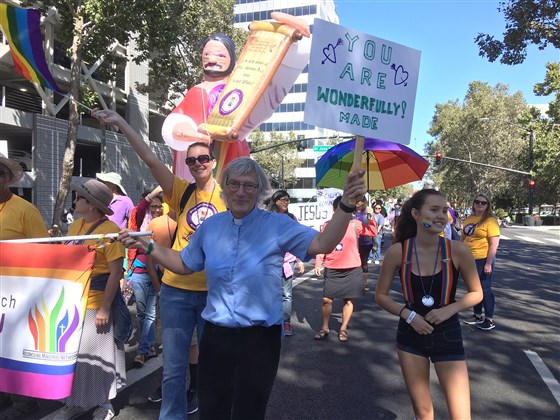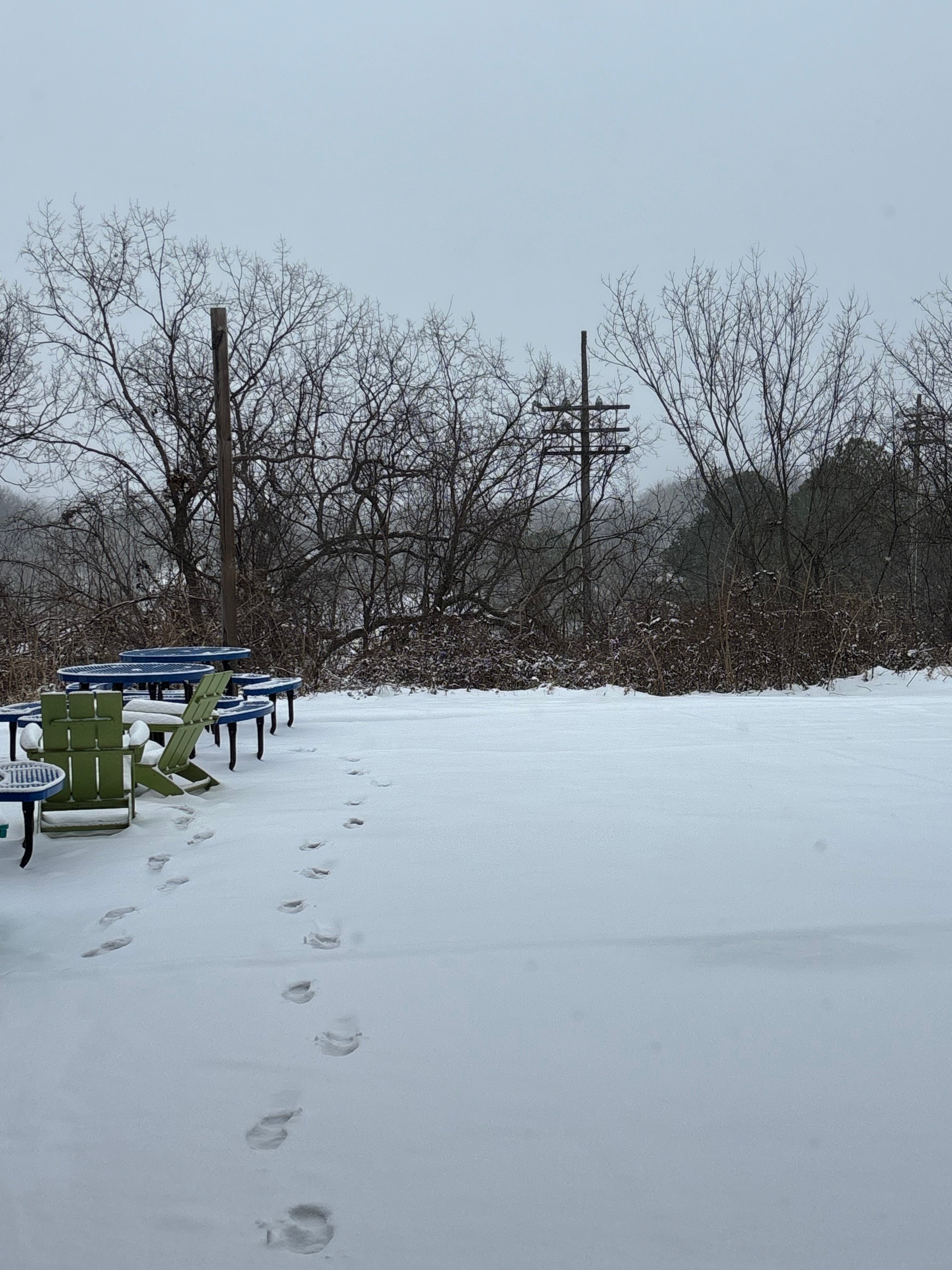![]()
Posters covered with words of solidarity hung around the room with rainbow stripes and checkers draped around the necks of many who stood in the atrium of a former football stadium in St. Louis, Miss., at the United Methodist Convention. Leaders of the second largest Protestant Denomination gathered to vote on the acceptance of LGBTQ+ clergy and LGBTQ+ weddings in United Methodist Churches.
The United Methodist Convention meets every four years to discuss and vote on issues facing the church and church members. The previous convention met in 2016. However, this year, the UMC decided to hold a special conference to vote on several issues, the primary issue being the increased ban on LGBTQ+ clergy and the ability of LGBTQ+ clergy to perform gay wedding ceremonies within the church. On Feb. 26, 864 delegates met to discuss three separate possible plans for action within the United Methodist Church.
Reverend Clark Atkins, senior pastor at the United Methodist Church of Siloam Springs, said delegates from outside the United States who come to the central conference make up 40 percent of the conference. By “2024, it’s expected that they will be the majority. This matters primarily because while culturally in the United States same-sex marriage and ordination of practicing as homosexuals is less of an issue for some people, especially generationally. It’s still something in some countries it’s a criminal act.” Atkins said the UMC is becoming more traditional because of the proportion of delegates from outside of the U.S.
The “Traditional Plan,” which was the strictest plan proposed at the convention, passed narrowly with a 53 percent to 47 percent vote. According to MSNBC, “while 60 percent of United Methodists in the U.S. believe homosexuality should be accepted, Americans only make up 56 percent of the general conference delegates. About 30 percent of the church’s members live in African nations, many of which still consider homosexuality a crime.”
The New York Times has also reported that “at least four ballots were cast by individuals who were not authorized to vote,” which has brought further outrage to the already incensed progressive members of the United Methodist Church.
The guidelines described in “The Traditional Plan” include the statement that, “The practice of homosexuality is incompatible with Christian teaching. Therefore, self-avowed practicing homosexuals are not to be certified as candidates, ordained as ministers, or appointed to serve in The United Methodist Church,” according to the United Methodist’s church’s full book of discipline statements. Also, because this plan passed, “clergy who officiate at same-sex weddings could receive a minimum one-year, unpaid suspension, and a second offense could result in removal from the clergy,” according to the New York Times.
Church members have discussed a potential split in the United Methodist Church online, in op-ed pieces and through social media. Although a United Methodist Church spokesperson has assured news outlets that the church will not split, it has fractured.
Caroline White, junior English major and long-time member of the United Methodist Church, said she knows this was a difficult decision for the church. “I do see it as being interpreted as hurtful by many LGBTQ members of the church. I don’t think it was intended to be that way. I definitely imagine that it would be difficult to hear such a decision and to feel that you are being loved and accepted.” White said, though, that she thinks this decision is, “A good example of Christian love as I see it in terms of not just total blind openness to anything and everything. We hold each other to a standard. So, I do think it’s a good example of holding other believers to a certain standard, but I think the non-Christian world doesn’t understand love in the same way.”
Emma Kastens, junior Biblical and theological studies major and former member of the United Methodist Church said, “If the church splits, I think [LGBTQ+ people] will feel safe on the side that accepts it. If it doesn’t split, there will be tension. We’re trying to divide ourselves, and division isn’t a sign of love. Love isn’t being represented well. It’s just so tragic.”
Kastens said Jesus reached out to the marginalized people of his time, the tax collectors, the prostitutes. She said LGBTQ+ people are the marginalized people in society today and the ones that “we need to reach out to. Even though the members of the church would be like, ‘no.’ That’s what Jesus called us to do to is to love and accept them.”
Some people fear that this decision could potentially harm the mental stability of LGBTQ+ members of the church. Kiralyn Tuttle, senior family and human services major said, “There could be a lot of people in the church that will stand up for them in churches that have been affirming, but it also gives space for people who don’t like that policy to speak up and make their voice heard, which can be really damaging to a person.”
Atkins said, however, that the decision was not about “shutting out or not welcoming LGBTQ+ people into our communities and into our churches. They’re always and always have been welcome. I think the difference comes in how you define that word practicing and what that means. For some, if they can’t be their full self and practice that, then they’re not being fully affirmed. They see an identity in Christ as being more important than self-expression.” Atkins said that he prays for LGBTQ+ members of the Methodist church because, “I don’t want anyone to be hurting over these decisions. It’s not an easy issue. For a lot of people, it is deeply personal, and I recognize that. It is something the church has been struggling with for almost 50 years.”
Many LGBTQ+ Christians have expressed deep sorrow over the decision of the UMC, such as an anonymous JBU student who identifies as bisexual. She said, for members in the church who have already come out, “Now everybody’s going to be like, ‘Oh, but now with this, what’s going to happen to you?’ It’s like coming out of the closet all over again. That’s a no. It’s just so tiring. I’m hoping that people will stand up.” She also said, “I think that everyone is part of the church. Every person is part of the body of Christ, even if they don’t think of themselves … we’re all the same. If you see people as your equal, you stop judging them. If you really love someone like you love yourself, that would make a difference.”
Senior Brandon Tuttle said, “The United Methodist church and the Episcopal church have historically been the two places that I know a ton of people who said their churches are functionally affirming … [and] has been a safe place for a lot of LGBTQ people.”
In an impassioned speech advocating for the rights of gay clergy like himself, JJ Warren—who was in the process of becoming an ordained pastor before the decision—expressed his lament of the UMC’s decision. “As someone who has grown up in our church, as someone who is gay and goes to the least religious college in the U.S., my evangelism on campus has grown. We have brought people to Jesus because they said they had never heard this message before. They didn’t know God could love them because their churches said God didn’t,” Warren said.
“If we can be a church which brings Jesus to people who are told they can’t be loved, that’s what I want our church to be, and that’s the Methodist church I love and that I want to be a pastor in one day,” Warren said. “I love our tradition. I love all of you. We are the church. Together, we are the body of Christ. We are stronger together than we are apart. No plan to separate us can unite us like God’s love. Let us be the church together.” The video of his speech went viral, garnering the sympathy of members and non-members alike across the country.
However, the United Methodist Church’s press release following the decision assured its members, “LGBTQIA people have not been banned by The United Methodist Church. Paragraph 4 of the Book of Discipline has not been changed. It still reads, “The United Methodist Church acknowledges that all persons are of sacred worth. We acknowledge, however, that many LGBTQIA people, their loved ones and allies were hurt by the speeches, rhetoric and decisions of the General Conference. We pray for healing and forgiveness.”
Above all else, Atkins said he still wants his church to be a place where the UMC’s brand motto stays true: Open hearts. Open minds. Open doors. “We’re getting back to work and we’re still welcoming of all people. We always have been. I’ve been the pastor here for nearly two years, and I have never seen a person be turned away. I’ve never seen a person be ostracized … that’s what we are called to be, hospitable and loving … This is a very loving congregation, and I am proud to be its pastor.”





